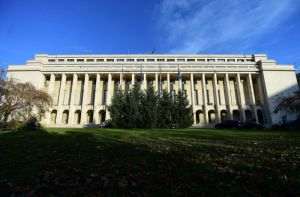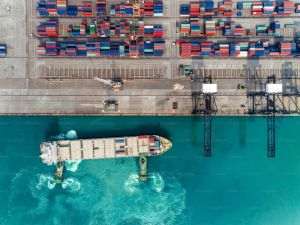Every successful year plants the seed of a future crisis, and 2015 is a successful year, governor Mugur Isărescu warned yesterday, and he expressed his hope that, this time, we will be "clever" enough to avoid that risk.
"How many times do we need to bang our head against the wall, to see that it is hard?" the head of the NBR asked, answering a question concerning the statements of former president Traian Băsescu, who said, on Monday, that "2017 will be the 2010 of the deep crisis, with a country that is profoundly destabilized economically".
The former head of state added: "I have the conviction that this year, with the electoral handouts that have been made, is the equivalent of the year 2007 during the time of Tăriceanu. The arrival of the new Fiscal Code means the equivalent of 2008 under Tăriceanu. I am doing my duty, as a man with a significant experience and who has no stake in the outcome, to warn that 2017 will be the year of a deep crisis, with a country that has been economically destabilized, and which will have once again a significant current account deficit, because consumption is once again being heavily encouraged, and Romania doesn't produce as much as Romanians would consume when they have money, on one hand, and on the other hand, it will have to borrow a lot of money to plug the holes created by the irrational fiscal relaxation that the current majority is implementing. (...) If the new fiscal code is passed, 2017 will be the equivalent of 2010".
The NBR governor yesterday warned again that the approval of the Fiscal Code in its current form "will change the economic trajectory".
The fiscal relaxation measures which are stipulated in the code "do not fit" together, the head of the NBR reiterated, and he went on to say that there are no substitutes for balanced macroeconomic policies.
Mugur Isărescu explained what evaluating risks means: "Internal, foreign phenomena are observed, the risks are evaluated, and it all starts from the reality that the seed of a financial crisis begin is actually planted during the years of success, because that's what is usually forgotten. The gene of the crisis starts in the successful year; for example, this year is a successful one. And this is concealed, it is often times not easy to track for a novice, but now technology has advanced tremendously, like in medicine, in tracking the seed of a financial crisis, risk gets assessed".
The head of the Central Bank said that, if the financial crisis is not approached in time, it is then always too late for an intervention, because the contagion phenomenon appears, and what is even worse, panic can occur.
Mugur Isărescu stressed the fact that risk assessment is one of the roles of the Macroprudentiality Committee.
"The assessment of risks is a process which we have been doing for a long time. What this committee is doing is not something new, and on the website of the NBR there are several presentations that are related to this word: macroprudentiality", the governor said.
When asked what will happen if the governor's opinion, as president of the committee, will differ from that of the prime-minister on various topics, Mugur Isărescu said: "Just like in any committee, the decisions are being made jointly. I have no veto power. At most, when the votes are tied, the chairman's vote weighs more".
The governor explained that based on the data that they have available, the Committee will make a forecast and a recommendation to one of the three institutions, as the case may be - the Government, the NBR or the ASF. The communication will be done in writing, and the institutions that receive the recommendations of the Committee have to respond in writing as well, with their solutions or with the reasons why they are unable to intervene in the issue in question.
"We do not make the Government's policy, we do not tell the lawmakers what laws to pass or not to pass, we will make recommendations. We can issue warnings to the ASF, to the NBR, the opinion must be read and an answer must be given", according to him.
The NBR official added: "If it doesn't take into consideration the Committee's recommendations, then the Government has assumed a risk and it bears the full political responsibility and will no longer have the option to say that it wasn't warned and the country would be hurt if the risk comes true. The Committee answers to the Parliament and to the public opinion".
According to Mugur Isărescu, such entities have been operating in the EU for over four years now: "It is not an attack against the Constitution, because there is no ubergovernment or dictatorship anywhere, it is a new institution which appeared after the 2008 crisis, which works very well".
Emphasizing that the new committee has a preventive role, the Governor further said yesterday that, this week, the talks concerning the Macroprudentiality Committee "have started down the path towards an understanding" of this entity, after having totally been "thrown off course, because of the hot weather", at the end of last week.
On July 22nd, the government has approved the creation of the National Committee for Macroprudential Oversight, an entity which will have a role of overseeing the national financial system, and which will be helmed by the governor of the NBR.
Reactions both in favor and against it were not long in appearing.
Adrian Vasilescu, strategy consultant of the NBR, said that the new structure "will be kind of a council of wise men", which will admit opinions and analyses.
The National Committee for Macroprudential Supervision, is in fact an "ubergovernment", says lawyer Gheorghe Piperea, who emphasizes the fact that the recommendations which it will make to the NBR, as well as to the ASF and to the government will be mandatory, according to the draft law.
To the contrary, Eugen Teodorovici claims that the recommendations of this "council of wise men" will not be "legal obligations" the implementation of which would be required: "The government will review the recommendations and if it doesn't implement them, it will have to present justifications on why it didn't".
But the communiqué issued by the government states otherwise: "The intended recipients of the recommendations made by the National Committee for Macroprudential Oversight are either the NBR and the ASF, as sector-specific financial oversight authorities, or the Romanian Government.
After receiving such recommendations or warnings, according to the draft law, their intended recipients have the obligation to implement the recommended measures or to take action towards reducing the risks they have been warned about, including by issuing regulations".
Cristian Pârvan, the secretary general of the Association of Romanian Businesspeople (AOAR), agrees with Mr. Piperea's opinion, and stresses that such a financial stability council already exists at the level of the NBR: "The Committee is definitely unconstitutional. What do we even need the parliament, the government and the ministers for, if we have this council? You can't hand over the country's laws to people who are not elected by citizens".
Economic analyst Florin Cîţu shares a similar opinion. He made the following statement, quoted by Digi24: "Apparently this committee is taking over and it can not only obstruct, but it can also impose decisions upon the government, in the name of macroprudential stability. (...) It cannot be audited by the parliament, it can't be audited by anybody, they are a bunch of technocrats that make decisions, and their recommendations are apparently obligations for the others".
Provisional PSD president Liviu Dragnea, said that he does not agree to the draft law concerning the creation of the committee, saying that it is "very serious" and that he had not known about it.
The legislative project which stipulates the creation of the new Macroprudentiality Committee is set to be approved in the Parliament.


















































